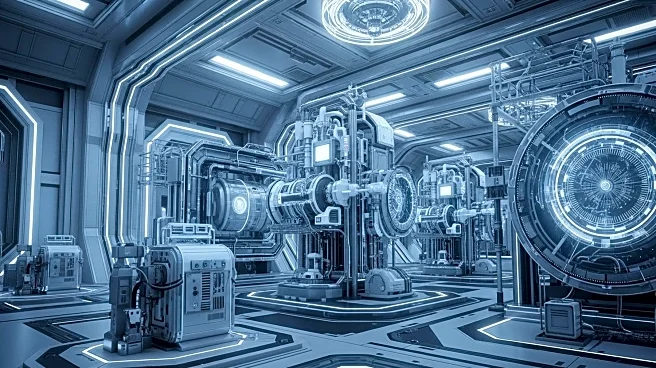What is the story about?
What's Happening?
Dayton-Phoenix Group, a longstanding partner in heavy industry since 1939, is advancing its efforts in decarbonization by introducing practical and responsible solutions aimed at reducing fuel use, improving efficiency, and cutting maintenance costs. The company is focusing on technologies that offer a return on investment while supporting sustainability goals. Key innovations include the APEX system, designed as an aftermarket upgrade for Komatsu trucks, and the SYNC platform, which combines APEX technology with a high-power battery pack to capture braking energy. Additionally, the VOLT technology offers a modular, swappable battery-electric tender for rail sectors, promising significant diesel fuel consumption reductions. These technologies are engineered to integrate seamlessly with existing equipment, minimizing disruption and maximizing efficiency.
Why It's Important?
The introduction of these technologies by Dayton-Phoenix is significant as it addresses the growing demand for sustainable practices in heavy industries such as mining and rail. By reducing diesel consumption and emissions, these innovations contribute to the industry's net-zero carbon goals. The ability to retrofit existing equipment with minimal modifications allows operators to achieve sustainability targets without incurring the high costs associated with purchasing new machinery. This approach not only supports environmental objectives but also offers economic benefits through reduced operational costs and improved asset longevity. The flexibility and scalability of these solutions make them attractive to a wide range of operators, potentially leading to widespread adoption and significant industry impact.
What's Next?
Dayton-Phoenix plans to continue testing and validating its technologies in real-world environments, with the APEX-930 system already undergoing rigorous trials on Komatsu trucks. The company is also exploring the integration of new battery chemistries to enhance the SYNC platform's versatility. As these technologies gain traction, they are likely to influence industry standards and practices, encouraging other companies to adopt similar sustainable solutions. The success of these initiatives could lead to further innovations and collaborations aimed at achieving greater sustainability in heavy industries.
Beyond the Headlines
The broader implications of Dayton-Phoenix's innovations extend beyond immediate environmental and economic benefits. By setting a precedent for practical and scalable decarbonization solutions, the company is contributing to a cultural shift within heavy industries towards more sustainable practices. This shift could inspire regulatory changes and increased investment in green technologies, further accelerating the transition to a low-carbon economy. Additionally, the focus on retrofitting existing equipment highlights the importance of resource efficiency and the potential for significant environmental gains without the need for extensive new infrastructure.
















